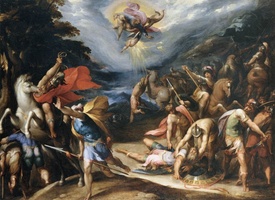Gladly will I glory in my infirmities, that the power of Christ may dwell in me.
Among the biblical readings from today’s liturgy there is the celebrated text of St. Paul’s First Letter to the Corinthians in which the Church is compared to the human body. The Apostle writes: “As a body is one though it has many parts, and all the parts of the body, though many, are one body, so also Christ. For in one Spirit we were all baptized into one body, whether Jews or Greeks, slaves or free persons, and we were all given to drink of one Spirit” (1 Corinthians 12:12-13). The Church is understood as a body, which forms with Christ, who is the head, one single whole. Nevertheless, what the Apostle wishes to communicate is the idea of unity in the multiplicity of charisms, which are the gifts of the Holy Spirit.
Thanks to these gifts the Church presents itself as a rich — and not a uniform — living organism, the fruit of the one Spirit who leads all into a profound unity, assuming the differences without abolishing them and realizing a harmonious ensemble. It prolongs the presence of the risen Lord in history, especially through the Sacraments, the Word of God, the charisms and the offices distributed in the community. For this reason, it is precisely in Christ and in the Spirit that the Church is one and holy, that is, an intimate communion that transcends and sustains human capacities.
I would like to emphasize this aspect while we are observing the “Week of Prayer for Christian Unity,” which concludes tomorrow, the Feast of the Conversion of St. Paul. Following tradition, I will celebrate vespers in the afternoon in the Basilica of St. Paul Outside the Walls, with the participation of representatives from the other Churches and ecclesial communities present in Rome. We will ask God for the gift of the complete unity of all the disciples of Christ and, in particular, according to this year’s theme, we will renew the commitment to being together witnesses of the crucified and risen Lord (cf. Luke 24:48). The communion of Christians, in fact, makes the proclamation of the Gospel more credible and efficacious, as Jesus himself said as he prayed to the Father on the eve of his death: “That they may be one … that the world might believe” (John 17:21).
(Pope Benedict XVI, Angelus Address, January 24, 2010; Image of the “Conversion of Saint Paul” by Hans Speckaert)
